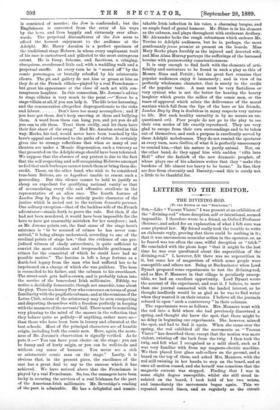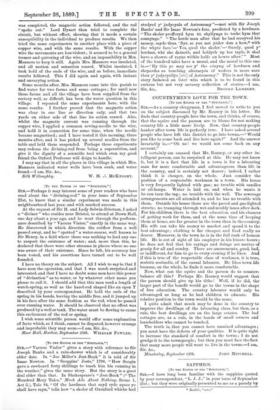LETTERS TO THE EDITOR. .
THE DIVINING-ROD.
LTO THE EDITOR OF TIER " SPECTATOR:1
SIR,—Like " Vacuus Viator," I was present at an exhibition of the " divining-rod " where deception, self or intentional, seemed impossible. I therefore wrote to a friend, an Oxford Professor (Science), and asked for an explanation of what I felt sure was some physical law. My friend really took the trouble to write an elaborate reply, proving that there could be nothing in it; that it was unconscious muscular action in the operator, or, as he feared was too often the case, wilful deception or " trick." He concluded with the pious hope " that it might be the last time he was ever questioned about the superstition of the divining-rod." I, however, felt there was no superstition in it, but some law of magnetism of which some people were susceptible and others not. Being at Buckminster when Lord Dysart proposed some experiments to test the divining-rod, and as Mrs. F. Manners in that village is peculiarly suscep- tible, we had an excellent opportunity. Lord Dysart wrote the account of the experiment, and sent it, I believe, to more than one journal connected with the landed interest, as he thought landlords would be as glad as he was to find water when they wanted it on their estates. I believe all the journals refused to open " such a controversy " in their columns.
The experiments were as follows. Mrs. Manners went with the rod into a field where she had previously discovered spring,,and thought she knew the spot, that there might be no delay in beginning our experiments. She, however, missed the spot, and had to find it again. When she came over the spring, the rod exhibited all the movements as " Vacnus Viator" has described them, except that the motion was more violent, twisting off the bark from the twig. I then took the twig, and felt what I recognised as a mild shock, such as I was very familiar with from my magneto-electric machine. We then placed four glass salt-cellars on the ground, and a board on the top of them, and asked Mrs. Manners, with the rod still twisting in her hands, to step on the board, and at once all motion ceased, and she herself was conscious that the magnetic current was stopped. Finding that I was in some slight degree susceptible, whilst she still stood in- sulated on the board, I took hold of her two wrists, and immediately the movements began again. This we repeated several times, and as regularly as the circuit
was completed, the magnetic action followed, and the rod "spoke out." Lord Dysart then tried to complete the circuit, but without effect, showing that it needs a certain susceptibility in the individual to produce results. We then tried the same experiments in another place with a piece of copper wire, and with the same results. With the copper wire the movements are less violent; it seemed to be a general tremor and quivering of the wire, and an impossibility in Mrs. Manners to keep it stilL Again Mrs. Manners was insulated, and all motion and sensation ceased. Whilst insulated, I took hold of the ends of the wire, and as before, immediate results followed. This I did again and again, with instant and unvarying action.
Some months after, Mrs. Manners came into this parish to find water for two farms and some cottages ; for until now those farms and all the village have been supplied from the rectory well, so difficult has been the water question in this village. I repeated the same experiments here, with the same results. I further proved that the magnetic action was clear in one line or direction only, and that two yards on either side of that line its action ceased. Also, whilst the magnetic current was running through the copper wire, I applied a common sewing-needle to the wire, and held it in connection for some time, when the needle became magnetised; and I have tested it this morning, three months after, and it has picked up several needles from the table and held them suspended. Perhaps these experiments may redeem the divining-rod from being a superstition, and give it the dignity of a scientific tool which even my good friend the Oxford Professor will deign to handle.
I may say that in all the places in this village in which Mrs. Manners indicated water wells have been sunk, and water found.—I am, Sir, &c.,







































 Previous page
Previous page